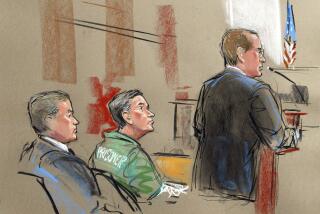Not Positive of CIA Role, Hasenfus Says : Testifies His Report Linking Agency to Contras Was Hearsay
- Share via
MANAGUA, Nicaragua — Captured American Eugene Hasenfus testified Sunday that he was running guns to U.S.-backed rebels when his plane was shot down but said his assertion that the operation was run by the CIA was based on hearsay.
Appearing for the third straight day in court, the former U.S. Marine from Marinette, Wis., examined a four-page handwritten confession the prosecution said he signed during interrogation and confirmed that it was his.
“It is my document,” Hasenfus told the court through an interpreter. “It is my signature.”
In the confession, Hasenfus, 45, who was captured Oct. 6, one day after his supply plane was shot down by Sandinista troops, said he was hired to help ferry guns, ammunition, food and other supplies to the U.S.-supported rebels, known as contras . His confession said he made four flights out of the U.S.-built air base at Aguacate, Honduras, and six out of the Ilopango air base in El Salvador.
Hasenfus asked to clarify part of the confession that said two men who ran the supply operation--identified as Max Gomez and Ramon Medina--”worked for the CIA,” and that Gomez was a friend of Vice President George Bush. Hasenfus said he had heard that information from pilot William J. Cooper and other members of the supply operation but that “I do not have the direct knowledge to definitely, personally know” that Gomez and Medina worked for the CIA.
Cooper, another American, Wallace B. Sawyer Jr., and a Nicaraguan radio operator were killed when the C-123 transport plane was shot down by Sandinista troops Oct. 5.
Worked in Southeast Asia
Cooper previously worked with Hasenfus in Southeast Asia in the late 1960s and early 1970s for Air America, an airline used by the CIA to supply rebel forces there, Hasenfus has said.
After his comments, Hasenfus signed a statement ratifying the confession, and his appearance before the tribunal president, Reynaldo Monterrey, ended less than an hour after it began.
Prosecutor Rodrigo Reyes told reporters it was irrelevant to Hasenfus’ case whether or not the operation was run by the CIA.
“We are not trying the CIA,” Reyes said. “We are trying a criminal named Hasenfus who was shot down over Nicaragua. We are not accusing him of being CIA but of a series of crimes.
“As a corollary to the case, there are a series of links that involve the CIA and the U.S. government,” Reyes said.
Hasenfus is on trial before a Sandinista Popular Anti-Somocista Tribunal. He faces Nicaragua’s maximum penalty of 30 years in jail if he is convicted of charges of terrorism, criminal association and violation of public security and order laws.
Reyes said he considered Sunday’s confirmation of the confession by Hasenfus an equivalent to a guilty plea.
But Hasenfus’ defense lawyer, Enrique Sotelo Borgen, said he looked on Sunday’s session optimistically, saying it disassociates Hasenfus from the CIA.
“It is now left clear he did not belong to the CIA,” Sotelo told reporters. “That is the important part. He was a worker . . . working for civil companies. He was never hired by the CIA directly.”
More to Read
Sign up for Essential California
The most important California stories and recommendations in your inbox every morning.
You may occasionally receive promotional content from the Los Angeles Times.










